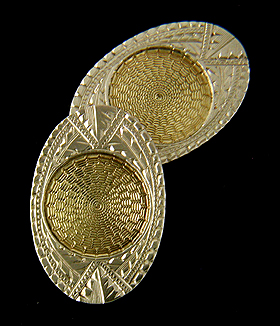
The Elegance of Art Deco CufflinksBy Arthur Anderson |
|
The Art Deco era coincided roughly with the years from 1920 to 1940, although examples of Art Deco design from earlier and later periods can be found. Art Deco was in part a turning away from the sinuous naturalism of Art Nouveau and the eclectic historic revivals of the Victorian era. But, even more, Art Deco was a reflection of the optimism, the sense of newness in a world leaving behind the horrors of World War I. Common Art Deco themes included stylized flora and foliage, dramatic sun bursts, and bold geometric designs. The cufflinks pictured above are a nice example of the latter. The bold, almost sculptural, border frames a rich green step-cut tourmaline. The cut and color of the tourmaline beautifully complement the design. Created by Larter & Sons in 14kt gold around 1930. One school of Art Deco design pursued the goal that no surface, no matter how small, should be left undecorated. This resulted in a body of Art Deco cufflinks that have become known as "The Complications," because of their rich, almost frenetic, level of detail This exuberant pair of cufflinks by Frank Krementz illustrates the finesse with which Art Deco jewelers were able to work a profusion of design elements into a small area. The centers feature dramatic sunrise motifs bisected by bands of black enamel and white gold. Surrounding the center is an oval course of engraved yellow gold with mille grain edges. Finally, the cufflinks are framed with white gold borders with repeating sunrise motifs. No survey of Jazz Age cufflinks would be complete without the bright, sparkling creations of Ziething & Company. Ziething combined bright-cut engraving with a nearly obsessive level of fine detail. The cufflinks literally teem with radiating star bursts, intricate geometric patterns and glistening textures. Ziething cuff jewels appear to dance and shimmer with reflected light. The above oval pair was created around 1925 with white and yellow gold. From the early years of the Art Deco period, the above white gold cufflinks feature detailed palmette corners and stylized water lily borders - possibly a reflection of the early 1920s interest in Egyptian themes inspired by the opening of King Tut's tomb in 1922. Early Art Deco cufflinks often featured orderly "greenhouses" of stylized flowers and plants. It was a movement away from the wild, untamed vines and foliage that often over grew late Victorian and Art Nouveau cuff jewels. The above cufflink features a border of stylized water lilies and waving grasses that surround a center engraved in a pattern evocative of the rippling surface of a wind blown pond. As the decade of the 1920s passed, the interest in stylized plant motifs was superseded by bolder forms and geometric designs which eventually morphed into the starkness of mid-Century Modernism. Many Art Deco jewels featured vibrant gemstones or richly colored enamels. The tourmaline cufflinks illustrated at the beginning of this note are a wonderful example. Then, in the late 1920s, a less colorful, but equally dramatic, new direction in Art Deco design emerged. Striking jewels emphasizing boldly contrasting areas of black and white, light and dark, captured the imagination of designers and couture jewelers. The above cufflinks feature dramatic Chinese-key motifs highlighted with black enamel backgrounds surrounding bright white gold centers engraved with linear pinstripes. The black-and-white cufflinks of the 1930s are among the most sophisticated and elegant jewels of the era. In closing, I illustrate two pairs of cufflinks from one of my favorite makers of the Art Deco era, William Huger & Company. The firm embraced the aesthetics of Art Deco design to create striking cuff jewels that speak to the optimism and excitement of the era. The above Huger cufflink reflects the same spirit of innovation that inspired one of America's largest contribution to Art Deco design - the modern skyscraper. The soaring pinstripe centers and bold geometric borders bring to mind the Chrysler Building, Rockefeller Center and other outsized icons of Art Deco design. The successful celebration of Art Deco in both the smallest and the largest objects of the era is witness to the styles almost universal appeal. This last pair of cufflinks, also by Wm. Huger & Company, illustrates the elegance of Art Deco design. Deep blue sapphires and sparkling diamonds are set in slightly domed centers engraved with radiant waves. The surrounding borders of geometric and stylized sunrise motifs are inescapably Art Deco. Crafted in 14kt white and yellow gold, circa 1925. Additional photos of these and other fine
antique cufflinks,
can be found in the Antique Cufflink Gallery. |
| |
||
| Antique Jewelry Galleries Antique Cufflink Gallery If you have any questions, suggestions or comments, I can be reached at .
Or, if you prefer snail mail, my postal address is: |
||
|
|







